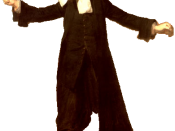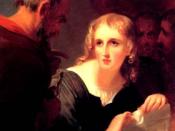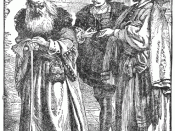One of the most central issues in 'The Merchant of Venice' is that of the antagonism between the Jews and the Christians. The unconscious, inborn dislike of cultures which jeopardise our way of life.
Ever since people have left their homelands to settle in other places there has been conflict between different cultures. So, in the play, Antonio, Bassanio, Gratiano and many more of the Christians feel resentment towards Shylock the 'alien'. This is partly because of the trap that he has led Antonio into and partly because he is different.
This seemingly unaccounted for dislike is shown particularly by Shylock who comments:
'I hate him for he is a Christian'
(act 1, scene 3, line 38.)
and then later on, in the trial scene itself, when asked to explain his actions he states:
'I give no reason, nor I will not, more than a lodg'd hate and a certain loathing, I bear Antonio'
(act 4, scene 1, lines 59-61.)
This speech shows how even Shylock himself cannot explain his deep-rooted hatred of Antonio (the Christian).
The opposite of feuds between cultures, are the bonds which are made between people of the same beliefs and habits. This is shown at the beginning of the Act in the form of a conversation between the Duke and Antonio, both of whom are Christian. In this conversation the Duke reveals his feelings on the matter.
I am sorry for thee: thou art come to answer to a stony adversary, an inhuman wretch uncapable of pity, void and empty from any dram of mercy.'
(act 4, scene 1, lines 3-6.)
However, Antonio seems to have no hope, and accepts the law without complaint. This opening view of Antonio portrays his temperament throughout the whole scene, right up until the very end...


